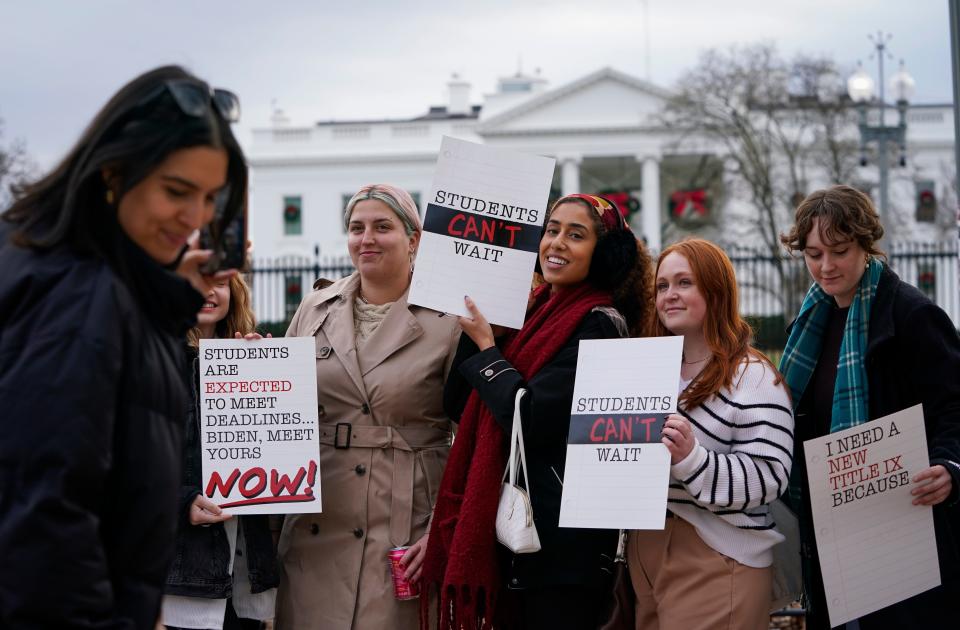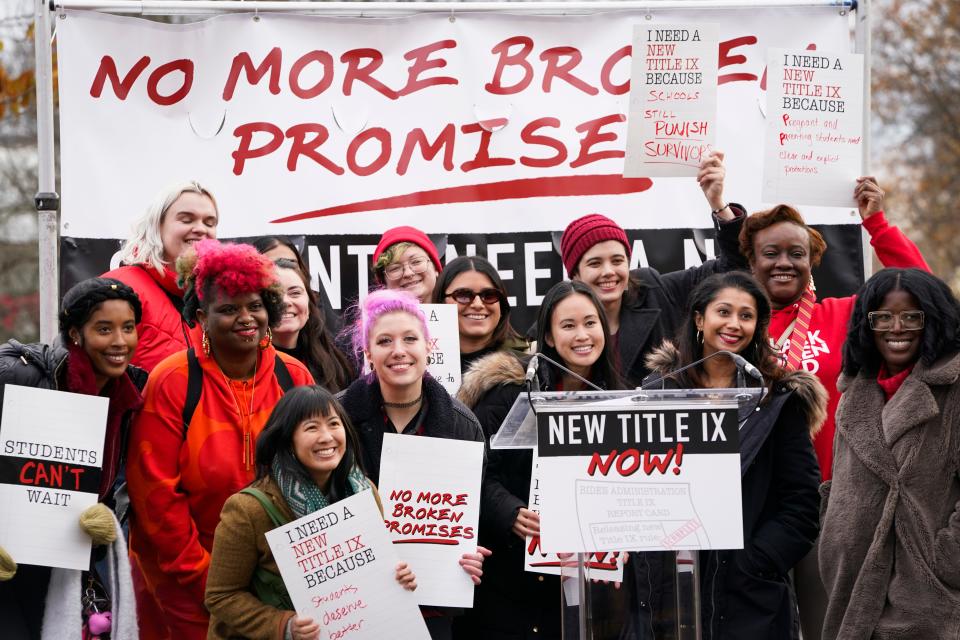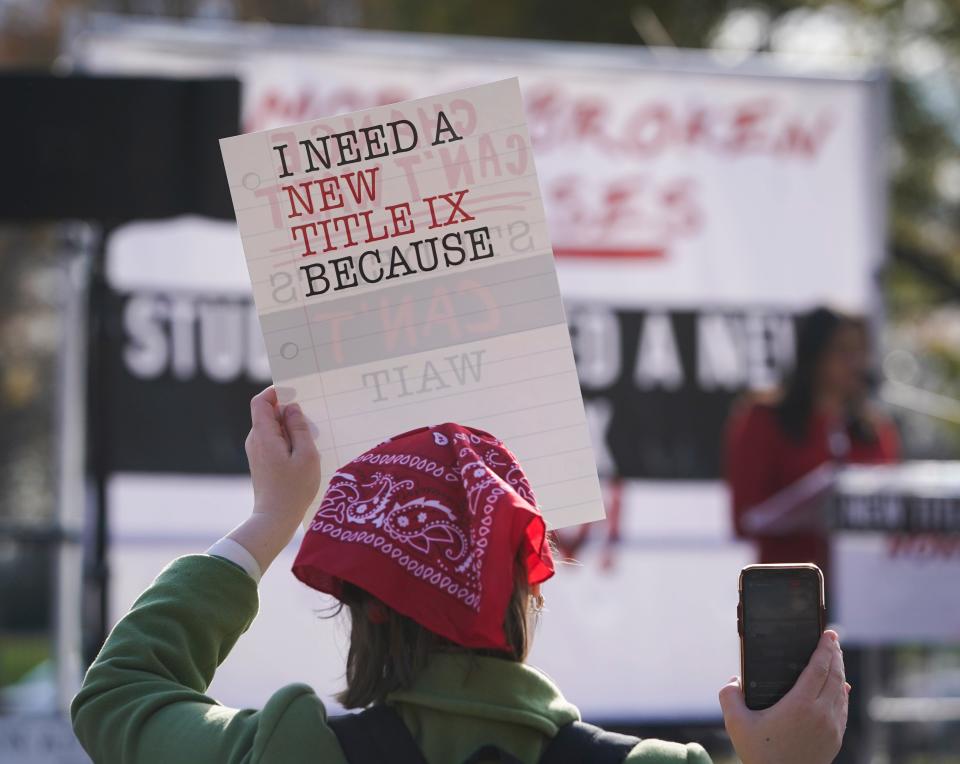Biden promised to reform Title IX. Students are tired of waiting
When Joe Biden ran for president, he promised to reform Title IX, the 1972 law that prohibits sex-based discrimination at schools that receive federal funding. Under his predecessor, Donald Trump, those accused of sexual misconduct were better shielded from consequences.
Those much-maligned standards are still in place, however, leaving a signature Biden campaign promise unfulfilled for nearly his entire first term in office. Over a year in, the administration proposed an overhaul of the federal rule, introducing guidance last June that would provide stronger support for transgender and nonbinary students, as well as victims of sexual assault.
Long-awaited: Biden administration proposes protections for transgender students and against sexual violence in schools
Those rules haven’t been finalized. Earlier this year, the Education Department said it expected to complete them by October, a month that has now come and gone without final versions of the rules.
The status quo has left an increasingly vocal number of students and advocates frustrated at the regulatory gridlock, especially as a likely rematch between Trump and Biden looms.
“They’re now entering into their fourth school year under this rule that has significantly deteriorated their rights,” said Shiwali Patel, the director of Justice for Student Survivors at the National Women’s Law Center, in an interview, referring to students who have reported sex-based misconduct since then or identify as LGBTQ+. "The longer we wait, the closer we get to the end of the administration and the election."

On Tuesday, students and Title IX reform advocates rallied in front of the White House, demanding “immediate action” from the Biden administration to put an end to the Trump-era guidance and implement Biden's new proposed protections for transgender and nonbinary student athletes and victims of sexual misconduct.
Sulakshi Ramamoorthi, a junior at American University in Washington, D.C., said she has suffered multiple sexual assaults while in college. Her Title IX investigation has dragged on for more than 260 days, she said.
She believes the system is failing her. Students across the country, she said, “cannot endure” another four years of the current regulations.
“The longer that Biden waits, the higher the risk,” she said.
Keeping secrets: These 6 universities kept Title IX sexual misconduct data secret
Biden moves to protect transgender student athletes
Over the summer, the Education Department took a key procedural step to implement its guidance on athletic eligibility under Title IX.
In a notice announced in April, the administration proposed largely preventing schools from barring transgender and nonbinary students from participating in school sports, with some exceptions.
“Every student should be able to have the full experience of attending school in America, including participating in athletics, free from discrimination," Education Secretary Miguel Cardona said at the time.

The move was lauded by some LGBTQ+ rights groups and condemned by Republican members of Congress. In recent years, the GOP has centered the issue in its party platform, prompting myriad state laws from conservative legislatures to keep trans and nonbinary students from competing, among other anti-LGBTQ+ efforts.
The GOP's antipathy toward trans students was on full display elsewhere in Washington on Tuesday, as a subcommittee of the GOP-led House Oversight Committee heard testimony from witnesses opposed to Title IX reform.
One of the witnesses was Riley Gaines, a former competitive swimmer who has repeatedly targeted swimming champion Lia Thomas, who is a trans woman. During the hearing, Gaines misgendered Thomas several times.
“Let me be perfectly clear: A school that knowingly allows a male athlete to take a spot on a women’s team, or allows a male athlete to take the field in a woman’s game, is denying a female student an athletic opportunity," Gaines said.
How did Betsy DeVos change Title IX?
During the Trump administration, Betsy DeVos, the former conservative education secretary who has advocated for abolishing the Education Department altogether, axed Obama-era Title IX guidance, making it harder for students who say they’ve been sexually harassed or assaulted to prove their case.
DeVos changed the rules in a number of ways, including by allowing schools to require victims to produce “clear and convincing” evidence that alleged sexual misconduct took place ? a higher bar than the standard schools previously used.
The Biden administration in June said that the standard should be lowered to a "preponderance of evidence" showing that an alleged event is more likely than not to have happened. The administration's stance is supported by a number of victims' rights groups.

What’s behind the delay?
Reforming federal education policy is never simple.
For example, Biden’s efforts to forgive student loans, another campaign promise, have been blasted by his political enemies or rendered moot by the courts. Even smaller, more successful policy changes that he’s managed to push through on student loans have faced an inescapable tangle of red tape from the Education Department.

Title IX reform has proven particularly challenging, though exactly what is holding up the process beyond typical regulatory hurdles is unclear. In a letter sent to the department last Thursday, dozens of House Democrats urged the administration to pick up the pace.
An Education Department spokesperson wrote in an email to USA TODAY on Oct. 17 that the department is thoroughly scrutinizing hundreds of thousands of public comments about the proposed Title IX rules and plans to complete the process as soon as possible.
The agency did not respond to a request for more information or explanation on Tuesday.
Zachary Schermele is a breaking news and education reporter for USA TODAY. You can reach him by email at [email protected]. Follow him on X at @ZachSchermele.
This article originally appeared on USA TODAY: Title IX reform was a Biden campaign promise. It's very delayed
